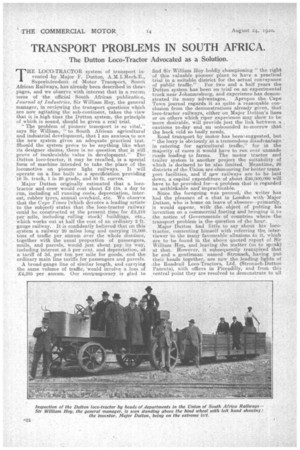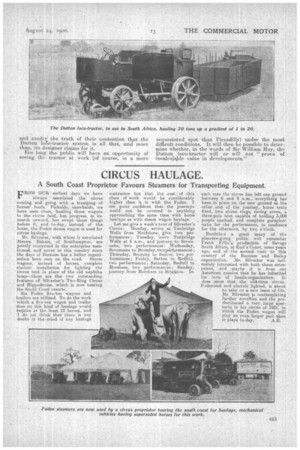TRANSPORT PROBLEMS IN SOUTH AFRICA.
Page 14

Page 15

If you've noticed an error in this article please click here to report it so we can fix it.
The Dutton Loco-Tractor Advocated as a Solution.
THE LOCO-TRACTOR system of transport invented by Major F. Dutton, A.M.I.Mech.E., Superintendent of Motor Tranaport, Sown African Railways, has already been described in these pages, and we observe with interest that in a recent. 'issue of the official South AfriCan publicatix.n, Journal of Industries, Sir William Hoy, the general manager, in reviewing the transport questions which are now agitating the sub-continent, takes the view that it is high time the Dutton system, the principle of which is sound, should be given a real trial. " The problem of pioneer transport is so vital," says Sir William, " to South African agricultural and industrial development, that I am anxious to see the new system given an adequate practical test. Should the system prove to be anything like what its designer claims, there is no question that it will prove of incalculable value in development." The Dutton loco-tractor, it may be recalled, is a special form of machine intended to take the place of the locomotive on pioneer light railways. It will operate on a line built to a specification providing 16 lb. track, 1 in 20 grade, and 50 ft. curves.
Major Dutton originally estimated that a locotractor and crew would cost about £2 15s. a day to run, including all running costs,depreciation, interest, rubber tyres, annual overhaul, etc. We observe that the Cape nines '(which devotes a leading article to the subject) states that the loco-tractor railway could be constructed at. the presenttime. for £2,216 per mile, including rolling stock; buildings, etc., which works out at half the cost of an ordinary 2 ft. gauge railway. It is confidently believed that an this system a railway 20 miles long and carrying 1'8,000, tons of traffic per annum over the whole. distance, together with the usual proportion of passengers, mails, and parcels, would just about pay its way, including interest at 5 per cent, and depreciation, at a tariff of 3d. per ton per, mile for goods, and the ordinary main line tariffs far passengers and parcels.
A broad-gauge line of similar length, and carrying the same volume of traffic, 'would involve a loss of £4,285 per annum. Our contemporary is glad to find Sir William Hoy boldly championing'" the right of this valuable pioneer plant to have a practical trial in a suitable district for the actual conveyance of public traffic.". For two and a half years the Dutton system has been on trial on an experimental track near Johannesburg, and experience' has demonstrated its many advantages: Apropos the Cape Town journal regards it as quite a reasonable conclusion from the. demonstrations already given, that loco-tractor railways, either on Major Dutton's lines or on others which riper experience may show to be more desirable, will provide just the link between cautious to-day and an unbounded to-morrow that • the back veld so badly needs.
Road transport by Motor has beencsuggested, but " the lorry is obviously at a tremendous disadvantage" in catering for agricultural traffic," for in the majority of cases it would have to run over unmade roads leading to farms. The motor tractor and trailer system is another project the suitability of which is declared to be also limited. Meantime, 26 districts of the Union are clamouring for better transport facilities, and if new railways are to be laid down' a capital expenditure of about £26,000,000 will have to be provided for—a1 problem that is regarded as unthinkable and' impracticable.
Since the foregoing was penned, the writer has had the pleasure of a chat in London withMajor Dutton, who is home on leave of absence--.-primarily, it would appear, with the. object of putting his invention on a commercial footing and bringing it, to the notice of Governments of countries ;here the transport problem is the-question of the hour. Major Dutton had. little to say about his Ioeotractor, contenting himself with referring the, interviewer to the many favourable allusions to it, which are to be found in the above quoted report of Sir William Hoy, and leaving the matter (so to speak) at that. However, it silbsequently transpired that he and a gentleman named Stronach, having put. theirheads together,. are now the leading lights of the Roadrail Loco-Tractors, Ltd. (Stronach-Dutton Patents), with offices in Piccadilly, and from this central point they are resolved to demonstrate to all
and sundry. the truth of their contention -dila the Dutton loco-tractor system is all that, and znore than, its designer claims for it.
Ere long tho public will have an opportunity of seeing the tractor at work (of course, in a more sequestered spot than Piccadilly) under the most difficult conditions. It will then be possible to determine whether, in the words of Sir William Hoy, the Dutton loco-tractor will or will not "prove of incalculable value in developments."




























